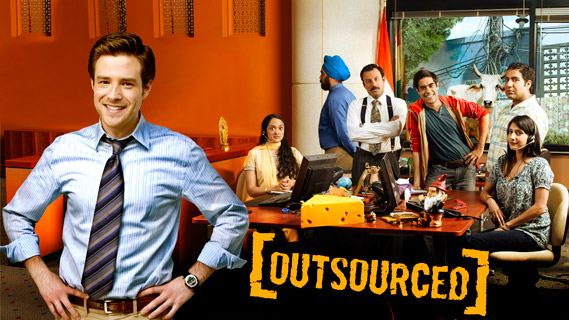I am loving the new sitcom on NBC: Outsourced. Now you say automatically, “Of course Jacki you’d love that show! There’s Indians on there!” Yes, I do admire and celebrate Indian culture as one of my favorites, but this show is truly enjoyable to watch with a lot of truth. Only 4 episodes have broadcasted, but I’ve enjoyed every minute of it.
The timing of this show couldn’t be more appropriate as we are at a turning point in history for Globalization. Although outsourcing is a fad started decades ago, with sweatshops in developing countries costing way less for labor, it has now become a wake-up call in our day to day lives. And now performed a lot more tastefully and humanely, an accepted part of our society. Especially 3 years ago when the US economy, among other prosperous nations, began to lose capital. Instead of paying $7 per hour, you could cut costs and pay an individual for example 1$ a day.
Our World is Interconnected
Thomas Friedman’s book The World is Flat points out many of these factual points. The world being interconnected. We are connecting on a day to day basis to people halfway around the world, the most popular being credit card companies, manufacturing companies (Guang-Tzo, China), and phone companies. If we have an issue with our credit card company, we call the 1800 number on back of our cards, and on the other end answers in a friendlier tone than any American call center “Hello, this is Roger, Who may I have the honor of speaking with today?” His name is most likely Raj, sent from a less fortunate village. His almost perfect American accent which you could almost not notice took him weeks of training, in a how to ‘speak like an American’ classroom among other call center workers in a bustling city like New Delhi or Mumbai. Or even the Phillipines or China.

In Outsourced, the main character is an American guy who is promoted as a manager of a gag gift company that sells things really of no worth. The operation is shut down in middle-America and the owner moves the operation to India to cut major costs. He dreadfully is sent there to manage and train a team of native workers on how to answer calls and sell the products. He has no clue what’s in store for him. But first things first, he must teach them about the American culture, which is virtually the complete opposite and contradicting as the Indian culture. While teaching them the ways, he gets to learn and adapt to the Indian culture.
A few hilarious differences are shown thus far, which exhibits a clear differentiation between the cultures. When the white guy is teaching the workers about his company, they ask ‘What is the point of this boob shirt?’ He answers ‘There is no point’. They bobble their heads even more frantically than normal in complete utter confusion. ‘Let me explain to you. That is American culture. Many things we do are in excess, with no point to it at all.’ The Indians try hard to understand, somewhat relating to the media they’ve seen. It is tough though, as they are a culture of modesty and non-excess from the Hinduism & Buddhism teachings.
Another cultural difference regarding marriage/dating is the main Indian character asks the white guy to introduce him to an American red head. The white guy thinks about it and says ‘My ex girlfriend is a red head, I’ll hook you up.’
The Indian guy is confused, ‘So she said no?’
‘No to what.’
‘To marriage!’
‘Ohhhh no, see in American culture, we date and break up, date and break up, til we find the one.’
The Indian guy is loving this exotic concept and wishes he could participate. ‘See, in our culture, we don’t date, we just get arranged to get married (sad lustful face).’
I’m not sure if this show is actually filmed in India or not. But you will spot the cows that roam freely on the roads, and most of the characters being vegetarian. Also the rickshaws, the family custom of generations living under the same roof. I think this show is a fantastic gateway (but certainly just a starting point) for Americans to understand a culture so different from our own. But a culture whose lives are intertwined with ours on a day to day basis, whether we like it or not. From the clothing, we wear (made in India) to the phone calls we make to the latest technological inventions. And one day may become a hyper-power after China.
